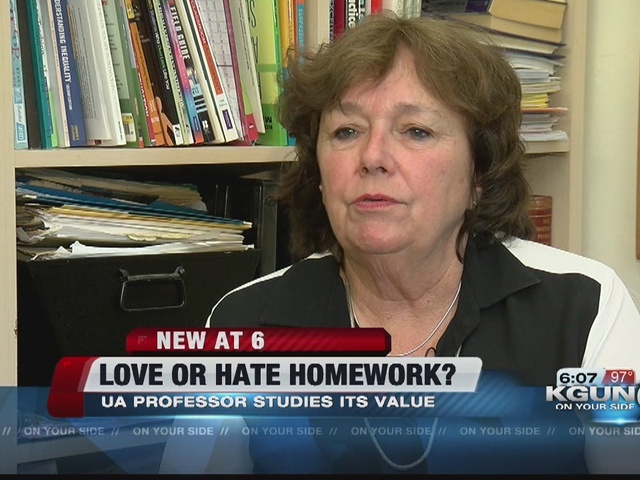TUCSON (KGUN9-TV) - A University of Arizona Professor believes kids should not have homework until they reach college.
Dr. Etta Kralovec is an Associate Professor of Teacher Education and author of the book “The End of Homework: How Homework Disrupts Families, Overburdens Children, and Limits Learning.”
"In K-6 there's absolutely no positive impact from homework and a negative impact," said Kralovec.
One reason Kralovec says homework can stunt a child's development is because it takes away from their time to do after-school activities or spend time with family.
"Kids need to experience something other than more school work when they get home at night," said Dr. Kralovec, adding that homework can have that same effect through high school.
She says skipping the after-school activities for homework time could even hurt your child's chances of getting into college.
"I think that's what colleges look for now is, 'Who is this student and what are their passions?' And I don't think that it's possible, when high school kids have hours of assigned homework every night, for them to develop their passions," said Kralovec.
Michelle Simon serves as the Moderator for Tucson Unified School District's School Community Partnership Council. Her son, Tommy, is a student at University High School.
Because Tommy has 2-3 hours of homework a night, Michelle says he had to give up other activities and only has time for marching band rehearsals.
"They're right after school starting at 3:30 until about 9 o'clock at night and then he does homework after that," said Michelle.
The work can sometimes cut into his sleep, which research has shown can cause migraines, ulcers and weight gain in kids.
Michelle does not think homework should be done away with altogether like Kralovec suggests, but she does think kids should have less and it should only include things like memorization and more creative assignments.
Michelle helps her son with homework, which is sometimes the most time they get together. However, even with two Master's degrees, Michelle still has some difficulty sometimes.
"The classes just get more difficult to the fact that he'll be doing calculus, which, forget it, I'm not going to be able to help him do that," laughed Michelle.
Other parents have trouble helping their kids with even more simple assignments. That is another reason Dr. Kralovec believes homework can put kids behind.
"Educational resources are not distributed equally in this country," said Kralovec. "Some kids go home to well-stocked libraries, high speed internet, and others go home to responsibilities with their siblings, no internet."
For that reason, Dr. Kralovec says each school district needs to decide what is best for their students.
Some districts across the country have decided to ban homework. An Elementary school in Maryland just asks students to read for 30 minutes a night.
Others, like schools in Iowa, have flipped the way homework is done, having students watch a recorded teacher lecture at home and then complete the assignment at school the next day so they can have their teacher available for questions.


